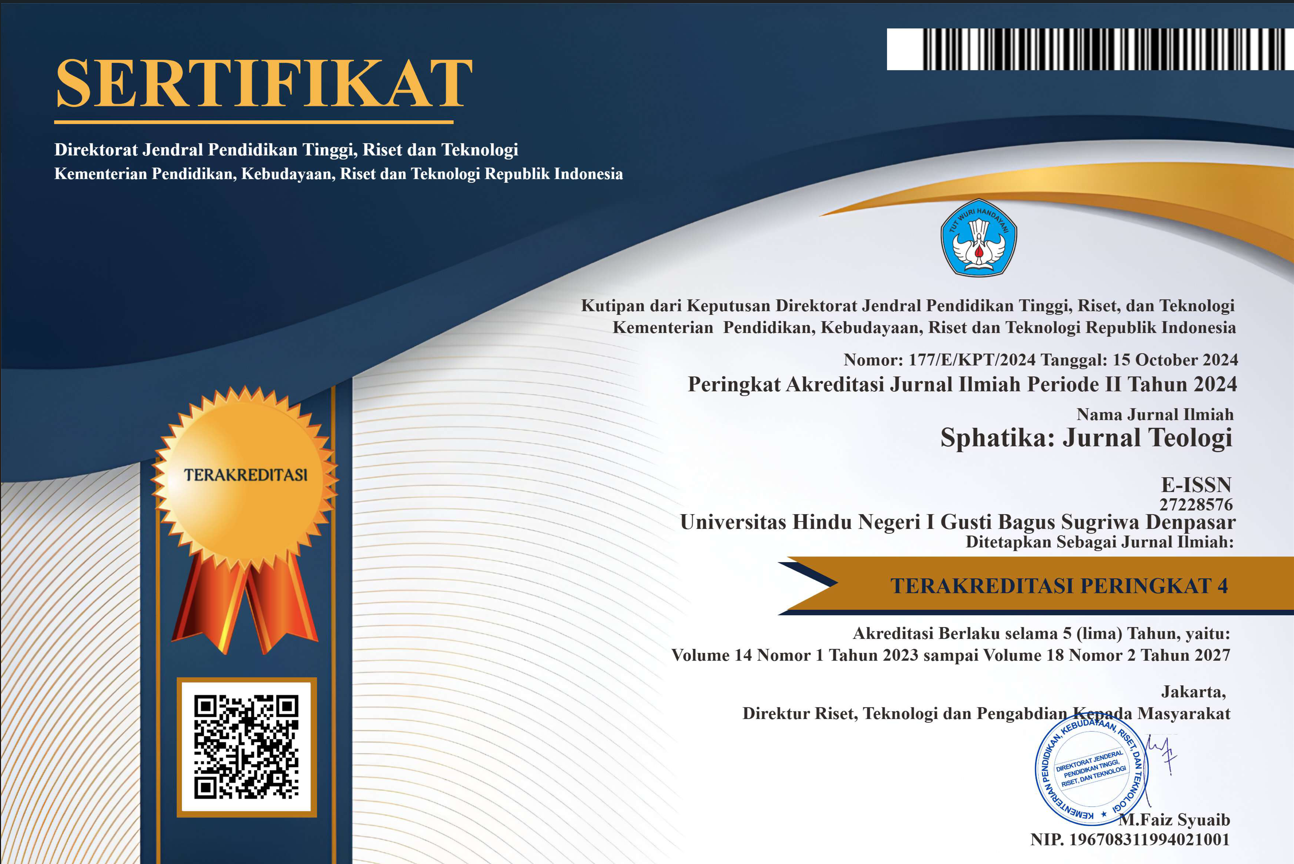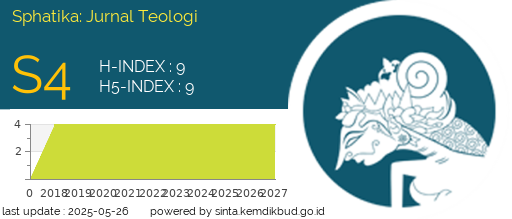Teologi Inklusif untuk Membangun Kerukunan (Analisis Teks Tutur Jatiswara)
DOI:
https://doi.org/10.25078/sphatika.v11i1.1954Kata Kunci:
inclusive theology; harmony; Tutur JatiswaraAbstrak
Harmony can be interpreted as a living and living condition that reflects an atmosphere of peace, order, peace, prosperity, respect, respect, price respect, tolerance, mutual cooperation in accordance with religious teachings. Harmony that adheres to the teachings of each religion can make every group among fellow human beings who have different beliefs as an open group (inclusive). Regarding this reality, in the text of Tutur Jatiswara there is an inclusive theological concept that can be a "nutrient" to build harmony, so that a plural religious life can live harmoniously, peacefully and help one another in the joys and sorrows. Inclusive is a way of thinking and an open attitude to all differences. Inclusive theology opens the door to apology and recognizes the existence of truth and salvation in other religions.
Based on several excerpts in the text of Tutur Jatiswara, that truth is not narrow and not exclusive, because the truth lies in a vast expanse. This means that the truth radiates on each side. Because it radiates on every side, humans must build an inclusive paradigm of thinking so that they can become 'religious people', not just 'feel' religious or do religious activities. By being a religious person, the application of life together will form mutual respect (price-respecting), compassion (love-loving), and fostering (respect) towards adherents of different religions because they have the same rights.
Referensi
Depag RI. 1997. Bingkai Teologi Kerukunan Hidup Umat Beragama di Indonesia. Jakarta: Badan Penelitian dan Pengembangan Agama Proyek Peningkatan Kerukunan Umat Beragama di Indonesia. Diakses melalui digilib.uinsby.ac.id Tanggal 25 Agustus 2015 Pukul 09.54 WITA.
Donder, I Ketut. 2009. Teologi: Memasuki Gerbang Ilmu Pengetahuan Ilmiah tentang Tuhan Paradigma Sanatana Dharma. Surabaya: Paramita.
Effendi, Muhamad Ridwan. 2012. “Teologi Inklusif: Kupas Tuntas Pemikiran Nurcholis Madjid (Cak Nur)”. Diakses melalui http://klinikpencerahan.blogspot.co.id Tanggal 16 Pebruari 2016 Pukul 10.55 WITA.
Haerudin, Mamang M. 2015. “Menyikapi Insiden Charlie Hebdo” diakses melalui www.kompasiana.com Tanggal 18 Juli 2015 Pukul 10.00 WITA.
Jalaluddin. 2012. Psikologi Agama, Memahami Perilaku dengan Mengaplikasikan Prinsip-Prinsip Psikologi. Jakarta: Rajawali Pers.
Kuswanjono, Arqom. 2006. Ketuhanan dalam Telaah Filsafat Perenial, Refleksi Pluralisme Agama di Indonesia. Yogyakarta: Badan Penerbitan Filsafat UGM.
Lubis, Ridwan. 2005. Cetak Biru Peran Agama. Jakarta: Puslitbang.
Munawar-Rachman, Budhy. 2000. “Mengenbalikan Kerukunan Umat Beragama”. Diakses melalui http://luk.staff.ugm.ac.id Tanggal 16 Pebruari 2016 Pukul 10.17 WITA.
Nurfitasari, Diyah Ayu. 2014. “Teologi Pluralisme dalam Perspektif Pemikiran Gus Dur”. (Skripsi). Semarang: Institut Agama Islam Negeri Walisongo Diakses melalui Tanggal 24 Juni 2015 Pukul 01.20 WITA.
Syaukani, Imam. 2008. Kompilasi Kebijakan dan Peraturan Perundang-Undangan Kerukunan Umat Beragama. Jakarta: Puslitbang.
Zoetmulder, J dan S.O. Robson. 2011. Kamus Jawa Kuna-Indonesia. Terjemahan oleh Darusuprapta dan Sumarti Suprayitna, Jakarta: PT. Gramedia Pustaka Utama.
















